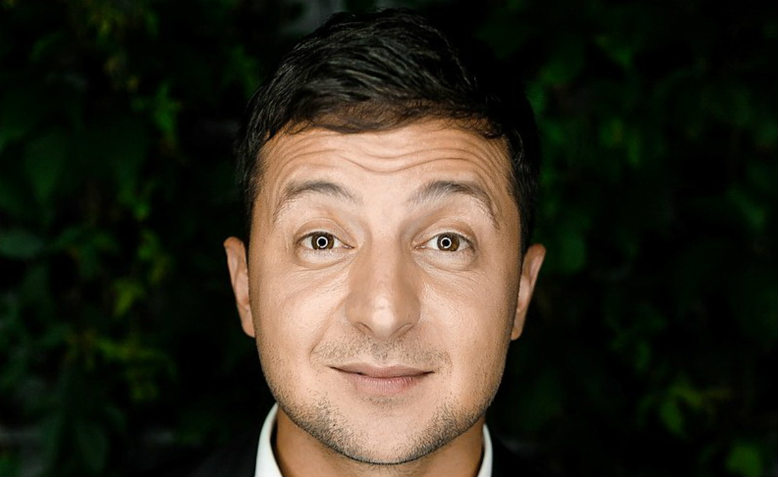 Volodymyr Zelenskiy. Photo: Wikimedia Commons
Volodymyr Zelenskiy. Photo: Wikimedia Commons
Volodymyr Zelenskiy’s election victory last Sunday is a sign people in Ukraine want change, but they will not get it from Zelenskiy, argues Vladimir Unkovski-Korica
After a run-off vote on Sunday 21 April, Volodymyr Zelenskiy was standing pretty at 73% of the vote against the incumbent Petro Poroshenko’s 24%.
Zelenskiy’s massive victory is a spectacular departure for Ukrainian politics, in which pro-Western and pro-Russian camps, often divided by region in the Ukraine, have been vying for control since the collapse of the Soviet Union.
Desire for change
Now, almost the entire country, except one province in the west of Ukraine, voted for Zelenskiy. At 41, he is young by comparison with his predecessor who is 53. Moreover, Zelenskiy is Jewish, underlining a major break with nationalist politics.
Ukrainians must also be having a laugh. Zelenskiy rose to prominence in Servant of the People, a satire, in which he plays a character who accidentally becomes president of the country.
But there are serious reasons why Zelenskiy was popular. In particular, his anti-war rhetoric paid off.
Ukraine has been in a state of hot and cold war with Russia since the overthrow of the pro-Russian Viktor Yanukovich in February 2014, and the Russian annexation of Crimea that followed quickly afterwards.
After that, Poroshenko, who took office in mid-2014, oversaw a deeply nationalistic and authoritarian turn in Ukraine, during which he imposed unpopular austerity measures. The rise of the extreme right in the Ukraine was also a notable feature of his reign.
That voters decided to reject not just Poroshenko, but traditionally pro-Western and pro-Russian politicians, who came third and fourth in the first round election, suggests that they are hungry for change.
And, duly, as Volodymyr Ishchenko has written, Zelenskiy was careful not to alienate different groups in his campaign and played instead an anti-establishment card which appealed to the desire for change.
Zelenskiy’s politics
However, to get change, ordinary people will not be able to rely on Zelenskiy. Zelenskiy received support from oligarchs close to the former Dnipro region governor Ihor Kolomoisky, who owns the 1+1 Media Group, which aired Zelenskiy’s satire.
Moreover, Zelenskiy’s anti-politics is not dissimilar to that of French President Emmanuel Macron, who met Zelenskiy in Paris before the second round of the Ukraine election, and who was quick to congratulate Zelenskiy after his victory.
Zelenskiy has for instance railed against corruption and the close links between the state and big capital. His solution is to argue that less state will mean less corruption.
This is a leaf straight out of the neoliberal textbook, which Macron is currently imposing on the French people, resorting to military violence against the gilets jaunes.
In foreign policy, too, Zelenskiy marks less of a break than is apparent. His team have already announced that Ukraine will continue its cooperation with NATO.
He may decide that the best way to keep the different factions of the ruling class onside in his divided country will be by trying to strike more of a balance between Russia and the West.
Moscow has signalled a desire for better relations, with Prime Minister Dmitry Medvedev stating that ‘there is a chance to improve relations with our country’, and Washington was also keen on Zelenskiy, with Trump being among the first statesmen to congratulate him on his victory.
A window is opened
But this is a tough walk on a tightrope for someone without a mass base or political party. Moreover, any success in balancing between East and West is likely to be accompanied by potentially very painful economic policies for ordinary people. Zelenskiy will therefore not deliver fundamental change.
And for anyone who does want fundamental change in the Ukraine, change which could deliver not just peace and independence on the international stage, but policies that favour people before profit, Zelenskiy will probably not even be an ally.
Nevertheless, the vote for Zelenskiy probably comes in spite of himself. It is a cry for a different kind of politics. The window is now open for this politics to emerge from below.
How long this window will remain open is anyone’s guess but the left in Ukraine has a chance it should not ignore. It will require creative thinking and sacrifice but hope and political clarity are always a spur to better things.

